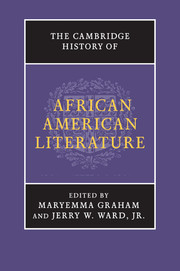Book contents
- Frontmatter
- Introduction
- PART I AFRICAN AMERICAN LITERATURE FROM ITS ORIGINS TO THE TWENTIETH CENTURY
- PART II AFRICAN AMERICAN LITERATURE IN THE TWENTIETH CENTURY
- 12 Foundations of African American modernism, 1910–1950
- 13 The New Negro Movement and the politics of art
- 14 African American literature and the Great Depression
- 15 Weaving jagged words: the black Left, 1930s–1940s
- 16 Writing the American story, 1945–1952
- 17 Geographies of the modern: writing beyond borders and boundaries
- 18 African American literature by writers of Caribbean descent
- 19 Reform and revolution, 1965–1976: the Black Aesthetic at work
- 20 History as fact and fiction
- 21 Redefining the art of poetry
- 22 Cultural resistance and avant-garde aesthetics: African American poetry from 1970 to the present
- 23 New frontiers, cross-currents and convergences: emerging cultural paradigms
- PART III AFRICAN AMERICAN LITERATURE AS ACADEMIC AND CULTURAL CAPITAL
- Bibliography
- Index
- References
15 - Weaving jagged words: the black Left, 1930s–1940s
from PART II - AFRICAN AMERICAN LITERATURE IN THE TWENTIETH CENTURY
Published online by Cambridge University Press: 28 May 2011
- Frontmatter
- Introduction
- PART I AFRICAN AMERICAN LITERATURE FROM ITS ORIGINS TO THE TWENTIETH CENTURY
- PART II AFRICAN AMERICAN LITERATURE IN THE TWENTIETH CENTURY
- 12 Foundations of African American modernism, 1910–1950
- 13 The New Negro Movement and the politics of art
- 14 African American literature and the Great Depression
- 15 Weaving jagged words: the black Left, 1930s–1940s
- 16 Writing the American story, 1945–1952
- 17 Geographies of the modern: writing beyond borders and boundaries
- 18 African American literature by writers of Caribbean descent
- 19 Reform and revolution, 1965–1976: the Black Aesthetic at work
- 20 History as fact and fiction
- 21 Redefining the art of poetry
- 22 Cultural resistance and avant-garde aesthetics: African American poetry from 1970 to the present
- 23 New frontiers, cross-currents and convergences: emerging cultural paradigms
- PART III AFRICAN AMERICAN LITERATURE AS ACADEMIC AND CULTURAL CAPITAL
- Bibliography
- Index
- References
Summary
“The story of the depression as it affected American Negroes, has not yet been adequately attempted,” wrote W. E. B. Du Bois more than three decades later. Arguably this story must engage labor, social, and legal histories of race and gender discrimination, and the effects of migration and urbanization on black Americans, and consider African Americans' increasing turn to a leftist politics invested in the black working class. Such a full narrative as this is quintessential for understanding black literary responses to the Depression. The US Unemployment Census revealed that 58 percent of black women and 43 percent of black men eligible for work were unemployed in 1931. For Du Bois, “the economic change” wrought by the Depression on the black middle class was nothing short of “revolutionary.” He calculated that “more than a third” of African Americans in US cities were driven to “public charity.” An even greater economic challenge, he argued, was presented by “the loss of thousands of farms and homes, the disappearance of savings among the rising Negro middle class, the collapse of Negro business.” According to Robert Bone, the 1930s witnessed a “new social consciousness” marked by organized protests, unionism, and a Left-leaning political culture. Seeking approaches to documenting black life during the 1930s and 1940s, many African American writers turned to the social sciences and Marxist ideology. These artists transformed a tradition of African American expressive culture (literature, painting, sculpture, dance, theater, and music) and reformulated a black aesthetic, and some, like Langston Hughes, Richard Wright, and Frank Marshall Davis, participated in larger global movements against fascism, imperialism, and colonialism.
- Type
- Chapter
- Information
- The Cambridge History of African American Literature , pp. 311 - 340Publisher: Cambridge University PressPrint publication year: 2011
References
- 3
- Cited by



